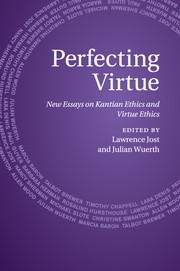Book contents
- Frontmatter
- Contents
- Notes on contributors
- Acknowledgements
- List of abbreviations
- Introduction
- 1 Virtue ethics in relation to Kantian ethics: an opinionated overview and commentary
- 2 What does the Aristotelian phronimos know?
- 3 Kant and agent-oriented ethics
- 4 The difference that ends make
- 5 Two pictures of practical thinking
- 6 Moving beyond Kant's account of agency in the Grounding
- 7 A Kantian conception of human flourishing
- 8 Kantian perfectionism
- 9 Aristotle, the Stoics, and Kant on anger
- 10 Kant's impartial virtues of love
- 11 The problem we all have with deontology
- 12 Intuition, system, and the “paradox” of deontology
- Bibliography
- Index
2 - What does the Aristotelian phronimos know?
Published online by Cambridge University Press: 04 February 2011
- Frontmatter
- Contents
- Notes on contributors
- Acknowledgements
- List of abbreviations
- Introduction
- 1 Virtue ethics in relation to Kantian ethics: an opinionated overview and commentary
- 2 What does the Aristotelian phronimos know?
- 3 Kant and agent-oriented ethics
- 4 The difference that ends make
- 5 Two pictures of practical thinking
- 6 Moving beyond Kant's account of agency in the Grounding
- 7 A Kantian conception of human flourishing
- 8 Kantian perfectionism
- 9 Aristotle, the Stoics, and Kant on anger
- 10 Kant's impartial virtues of love
- 11 The problem we all have with deontology
- 12 Intuition, system, and the “paradox” of deontology
- Bibliography
- Index
Summary
The question above is a way of asking, “What is moral knowledge, according to Aristotle?” For the Aristotelian phronimos – the practically wise man – has phronesis, which is a form of knowledge, and it is this that enables him (characteristically) to make correct decisions about what he should do. What the phronimos is excellent at, because of his phronesis, is practical reasoning.
What normative ethical theory aspires to do is enable those agents who apply it to reach correct decisions about what they should do, to provide a model of excellent practical reasoning. Hence modern moral philosophers who believe that we have much to learn from Aristotle have turned to his account of phronesis for insights about, among other things, the possibility of normative ethical theory. This generated a debate between particularists and generalists about codifiability and the role of moral principles, which overlapped with that between virtue ethicists and their critics over whether virtue ethics failed to be action-guiding because it failed to provide them.
Now I take it that, with respect to a normative ethical theory's providing action-guidance, the virtue ethicists have prompted new insights among the generalists. Some of the latter, at least, used to say that they were seeking not just a guide but “hopefully a determinate decision procedure” (Louden 1984: 228–29) for resolving dilemmas, and now they don't.
Keywords
- Type
- Chapter
- Information
- Perfecting VirtueNew Essays on Kantian Ethics and Virtue Ethics, pp. 38 - 57Publisher: Cambridge University PressPrint publication year: 2011
- 69
- Cited by

